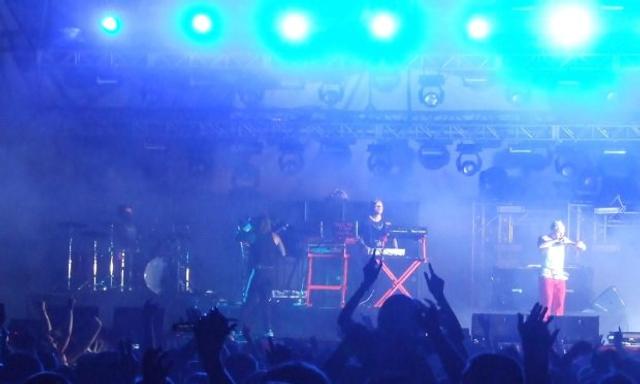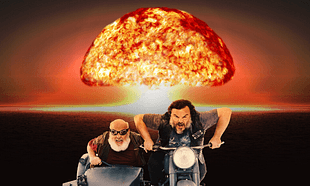The Prodigy's Fat of the Land regularly pops up in Best Album polls and a recently acquired 1001 Albums You Must Hear Before You Die sees the album sit alongside Sgt. Pepper, Astral Weeks, Pet Sounds, Ocean Rain, Born To Run and other greats. Fat of the Land, however, is not a great album. It's not even a good album.
To get into why Fat… sucks a fat one we have to remember what an innovative (stop sniggering down the back there) band The Prodigy actually were. So please indulge me this history round up…
I was a massive Prodigy fan – owning every single from Charly to Smack My Bitch Up (Still do - I even have What Evil Lurks somewhere in the wardrobe), spending serious cash to send away to the US for rare remixes. Experience (1992) blew me away. It was considered a singles genre and even though some had tried it (Shades of Rhythm, Altern-8), quality Rave albums were hard to come by - Experience showed it could be done, that interest could be kept over an LP. It was fast, it was hard, it was fun. Trying to make sense of the samples was part of it: Was it the horns, hordes or whores of Jericho? Wind It Up's 'Equal rights and justice in this time' sounded like 'Leave our lives while dust in in the sky.' Although it contained a live track, Liam Howlett wasn't out to cheat: Charly and Everybody In The Place were already hits (reaching 3 and 2 in the charts respectively) but they appear here in drastically remixed form. And that live track, Death of the Prodigy Dancers, not only kicked ass but was a rare insight into their live performances, something a 16-year-old Sligo kid wasn't privy to.
Two years later came Music for the Jilted Generation. I would have been happy with more of the same, but Liam wasn't content to sit on his laurels. That May's single, No Good (Start The Dance), was altogether harder than anything they released before and the video, a slick production, gave the four-piece personalities. Jilted Generation, despite what Liam says, stood for something. The Criminal Justice Bill was in full effect and the tracks (and sleeve art) tapped into the anger: Break And Enter, Voodoo People, Their Law, the comedown paranoia of the haunting Narcotic Suite, and Full Throttle (if they had to toss a B-side from 1993 One Love single onto the album, though, it should have been Rhythm Of Life).
Not content with sticking a middle finger to the authorities and boasting hard, dark tunes, Jilted Generation only went and invented a new sub-genre of dance music too. Electronic Punk was a mish-mash of techno, hip-hop and grunge. I was amazed that this Essex rave band could be so brave. I felt dance, hitherto sneered at by music critics, was on the cusp of greatness and duly snapped up tickets to their Sligo Sports Complex gig that Autumn, even though rumour had it that Dublin druggies were coming down with infected syringes. The druggies stayed at home, The Prodigy rocked, Keith Flint spat water at me, I got a cold sore, went home buzzing in my X-Worx, and was late for work the next day. Jilted's success was unparalleled in Prodigydom and indeed dance music – the album reached number two, kept off the top spot by Voodoo Lounge, the first Rolling Stones album in five years.
After Poison (1995), the last single culled from the album, things were quiet. Electronic Punks, a video compilation of music videos and live material sated the fan's thirst. There was a book too. Both were bought, both were studied endlessly. For what, I don't know. Maybe it was to feel closer to the band – the perpetual misguided teenage venture.
If things hadn't kicked off, they certainly did with their comeback single. March 1996 gave us Firestarter, which took Electronic Punk to a new level and, for the first time, gave this 'faceless techno' band a charismatic frontman in Keith Flint. Mainstream success and magazine covers beckoned. Breathe followed that November boasting what music critic Gary Mulholland called "one of the all-time greatest rhythm tracks ever to be dragged from a computer." The Prodigy were now stadium fillers and the world waited for the follow up album, the one to break them in America.
Then Fat of the Land hit the shops, went straight to Number One, and indeed broke them in the US. I couldn't wait to get it home and have a listen. I didn't have a Discman at the time and had to race to my sister's to play it. She lived a full fifteen minutes jog from the record shop – some distance when you have just bought a treasured new Prodigy release. I listened: opener Smack My Bitch Up kicked the proverbial, Diesel Power was Kool and Climbatize continued the instrumental weather-related tunes that started on Experience.
But something was wrong. I didn't want to admit it. I refused to accept it. But somewhere in my brain, the honesty section probably, something was telling me that it was a piece of shit.
So, after that self-indulgent, protracted introduction, here are my seven reason why Fat of the Land is pants…

1. Firestarter. Oh - controversial choice! I know. I am a fan of Firestarter – any song that generates complaints for scaring children on Top of the Pops is a belter in my book. Firestarter, however, came out a full fifteen months before the album was released and was pretty much old hat by that stage. It was just lazy stuff throwing it on the album of only ten tracks (Experience had twelve; Jilted had fourteen). The inclusion is a total reversal of the honest nature of Experience. Yes, Breathe is on there too, but you have to have a lead single to sell the album so Breathe's inclusion gets a pass.
2. Funky Shit. A welcome addition to Prodigy's flirtation with hip-hop that started with Poison (and continued with B-sides Molotov Bitch and The Trick). Like Firestarter, though, Funky Shit was ancient by 1997. My first introduction to the song was Prodigy's December 1994 gig in Ireland (which was broadcast live on RTE Radio if I remember correctly). The song is almost identical to that live performance two-and-a-half-years previous. Again, lazy stuff.
3. Serial Thrilla. A repetitive, substandard tune lacking in any ideas, the track just rumbles on and on without doing anything of note. A knock off of the punkish vocal from Firestarter, Keith Flint sneers 'taste me, come to me' for no reason at all. Serial Thrilla encapsulates the poorer moments of the album – most of it sounds like B-sides. Crap title too.
4. Mindfields fares a little better than Serial Thrilla but it never really gets going. You can't chill out to it, you can't dance to it. All you can do is stick it on the Matrix soundtrack and that's what it is good for – background music to something better happening in the foreground. It's easily ignorable and The Prodigy were never ignorable.
5. Narayan causes me much mental grief. The Prodigy up until this point were an innovative dance band but Narayan is a simple cash-in on then-popular Big Beat genre. Acquiring Crispin Mills, lead singer of then-big Kula Shaker, to lend his vocals was another attempt to cash-in on something very 'now'. In an album of missteps, this is the worst. The Brothers Chemical acquired the services of Noel Gallagher and Mercury Rev's Jonathan Donohue, Liam opted for Crispin Mills. Go figure. *
6. Fuel My Fire saw The Prodigy embrace Punk fully with this cover by L7. It's another repetitive tune that relies solely on Keith Flint's warped vocal. And let's be honest, he has an annoying singing voice. Before this he was just spouting words to whip the listener into a frenzy, here he had lyrics to contend with and the man can't carry a tune.
7. The Herman Goering quotes on the inner sleeve were troublesome. Still are. Why are they here? What does this say about the band? Are they just being offensive for the sake of it? Are they revelling in this? Answers point to yes when The Prodigy played a gig in Moscow. Flint, full of self-grandeur, stated in an interview at the time how security guards forcibly pushed back a revelling crowd. Flint made a point of pulling the burly security off the dancing teens and marvelled at "the lawlessness of that." Good man, Flinty. If you ever wonder where you lost it, it was here.
The brevity of invention on Fat of the Land might explain the five-year hiatus between Smack My Bitch Up and Baby's Got A Temper, which, it must be pointed out, sampled the same track Firestarter did - sampling your own samples is a sure sign of a band running out of ideas. The Prodigy were here before: Liam moved to block the release of Wind It Up in 1993, as he felt that the band had moved on and were no longer ravers. It was a major step back, he said, but record company XL forced his hand. Evidence that Liam couldn't tell the difference between what was working and what was not anymore is shown with his push of this release; five years waiting and all he could muster is one track and three 'remixes' – one of which is an instrumental, another an acapella – lazy, lazy cheats. Later, after everyone else told him so, Liam called it "a fucking piece of shit" and disowned it.
Somewhere in between Smack and Temper Liam released a DJ mix compilation, The Dirtchamber Sessions Volume One (Volume Two has yet to see the light of the day – maybe that's because no one listened to the first one more than once) and married an All Saint. Leeroy jumped ship, Keith had his own side project, Flint, and Maxim collaborated with Skunk Anansie's Skin on Carmen Queasy (don't remember how that one goes? It’s okay – no one does). 2004's Always Outnumbered, Never Outgunned jettisoned Keith and Maxim on the vocal front and looked to Juliette Lewis (!) and both Gallaghers for contributions. It came and went without interest and 2005's singles compilation Their Law (Baby's Got A Temper failed to even make it onto the double disc edition) was quickly released to recoup its poor sales. Experienced and Jilted were expanded and re-released too. By the time 2009's Invaders Must Die came about I was long gone (lead single Omen sounds like it could have been released in 1993). Watching Keith and Maxim bluster and bounce with angry defiance on recent live appearances posted on Youtube, I get confused. Why are they punching the camera? What are they livid about? What do they stand for now?
The Prodigy had peaked somewhere between the excellent Poison (1995) - the B-sides on Poison are as strong as anything found on their albums or singles - and Breathe (1996). By the time Fat of the Land came along, the band were already on the slide. It happens to some bands: the album that launches them to superstardom is usually on the back of the spadework of the previous album (Radiohead, The Bends). Fat… received such unworthy praise because there was guilt about being slow to pick up on what a ground-breaking album Jilted… actually was.
In the album's defence I have to point out that I was leaving the dance scene behind me in 1997. Releases from other dance heavyweights didn't resonate the way they would have – Orbital's In Sides bored me and Underworld's Beaucoup Fish was an album of two halves. ** College beckoned and so did new obsessions – The Stone Roses and The Smiths. The Prodigy will always hold a special place in my heart, though. They were the first band I was into – I traced the sleeve art of Experience into my school copies, I photocopied and pasted pictures from the book onto my stereo, I bought the T-shirts (short and long sleeve), and I tried, and failed miserably, to do the Prodigy Step. I listen to those old tracks sometimes – the rave ones are still fun but sound dated now; the tunes in and around Jilted, however, still sound like nothing else I've heard. There really was no other band that sounded like them.
* I own two Kula Shaker albums and an EP.
** I have since returned to appreciate those albums.









































































